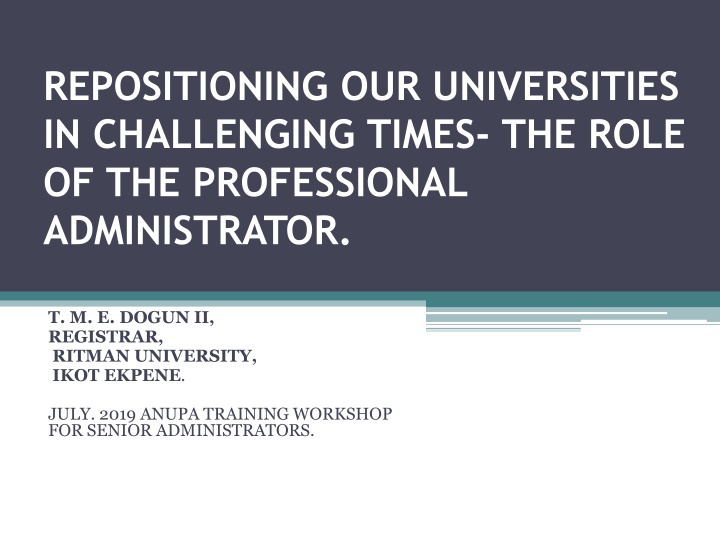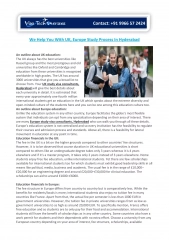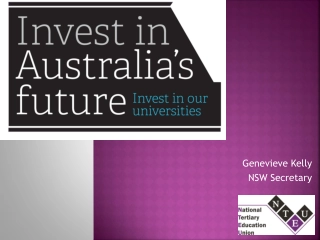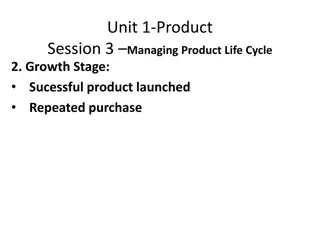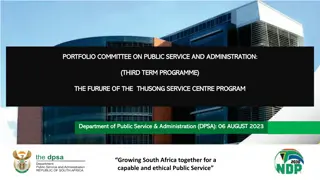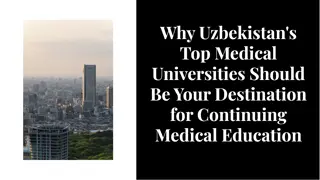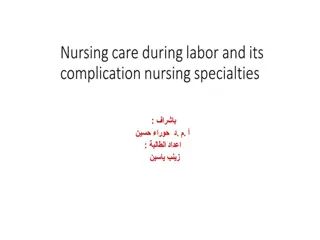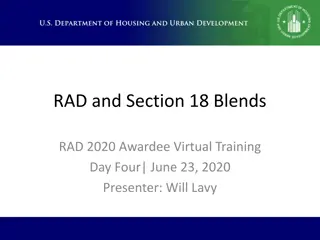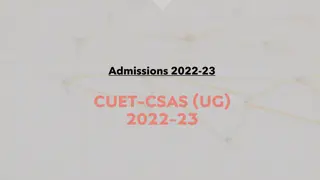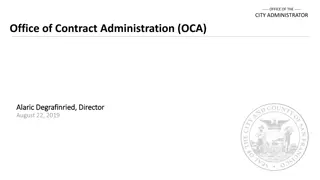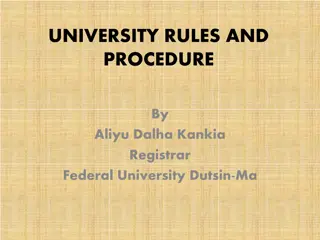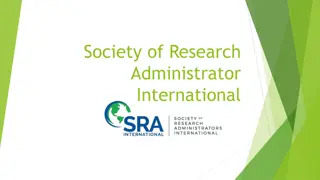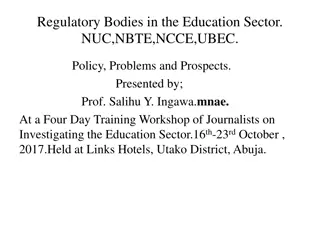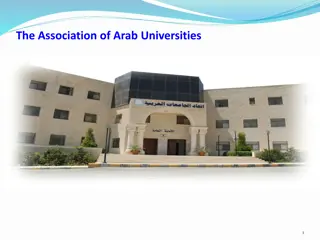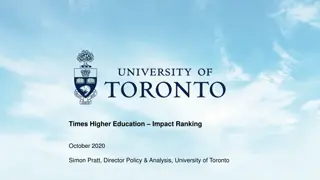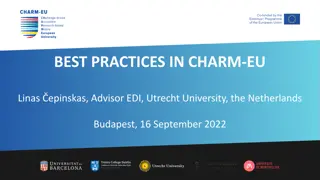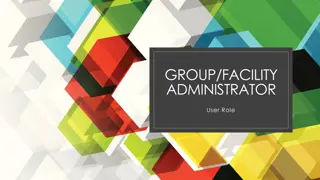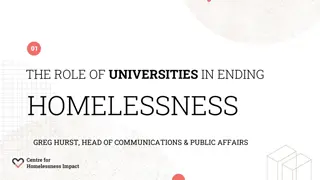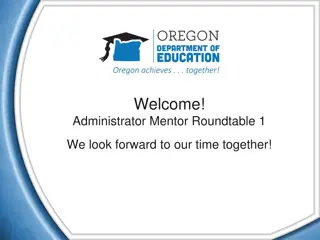Repositioning Our Universities in Challenging Times: The Role of the Professional Administrator
Universities are facing significant challenges in the rapidly changing world of the 21st century. The need for new ways of thinking and acting is crucial, as highlighted in a workshop for senior administrators. The characteristics of this century demand a shift in approach and a proactive stance to meet future needs effectively.
Download Presentation

Please find below an Image/Link to download the presentation.
The content on the website is provided AS IS for your information and personal use only. It may not be sold, licensed, or shared on other websites without obtaining consent from the author.If you encounter any issues during the download, it is possible that the publisher has removed the file from their server.
You are allowed to download the files provided on this website for personal or commercial use, subject to the condition that they are used lawfully. All files are the property of their respective owners.
The content on the website is provided AS IS for your information and personal use only. It may not be sold, licensed, or shared on other websites without obtaining consent from the author.
E N D
Presentation Transcript
REPOSITIONING OUR UNIVERSITIES IN CHALLENGING TIMES- THE ROLE OF THE PROFESSIONAL ADMINISTRATOR. T. M. E. DOGUN II, REGISTRAR, RITMAN UNIVERSITY, IKOT EKPENE. JULY. 2019 ANUPA TRAINING WORKSHOP FOR SENIOR ADMINISTRATORS.
INTRODUCTION In much of the world today, Universities are facing what been described as a thunderstorm of changes so fundamental that some say the very idea of the University is being challenged - George Kwanashie (2005)
INTRODUCTION So much has been written about our universities in an attempt to address the numerous challenges that they face The world in which the Universities are situated is experiencing rapid and sometimes, overwhelming changes.
INTRODUCTION These overwhelming changes call for new ways of doing things - new kinds of thinking and new kinds of associations. Our Universities more or less caught in the reaction mode rather than in the proaction , mode.
THE 21STCENTURY AND ITS CHARACTERISTICS
THE 21STCENTURY Evidence suggests that the advent of a new century always heralds the introduction of different thinking, different kinds of communication, different kinds of associations, in short, a different world, from the one previously known.
THE 21STCENTURY AND ITS CHARACTERISTICS Evidence suggests that the advent of a new century always heralds the introduction of different thinking, different language, different kind of associations, in short, a different world, from the one previously known.
THE 21STCENTURY AND ITS CHARACTERISTICS The difference between nations is uniquely determined by their ability to foresee the future and prepare for it by engaging their resources to benefit from it. The 20th century is gone, even though we use some of its vestiges still struggling to be relevant.
THE 21STCENTURY AND ITS CHARACTERISTICS The new century, barely twenty years old, has announced itself and with it comes plenty opportunities and possibilities which sometimes we prefer to call challenges. The 21stcentury has come with its own characteristics and some of them appear to be threatening the very foundation for our universities as we know them.
WHAT ARE SOME OF THESE CHARACTERISTICS?
WHAT ARE SOME OF THESE CHARACTERISTICS? The rise of the knowledge society- one in which more than ever before, knowledge and highly trained knowledge workers have become the driving force of economic growth and societal development. Globalization/ internationalization and increased competition (flat world)
WHAT ARE SOME OF THESE CHARACTERISTICS? The marketization of institutions and products. The democratization of governance - ensuring inclusivity, workplace diversity, and gender balance as critical issues. The necessity of life-long learning The revolution of ICT The demand for new skills in all fields of endeavour and to do things differently.
IN A NUTSHELL Standards, expectation and requirements that were once accepted are now being challenged and redefined for global acceptance Growing demand for things to be done differently. No longer business as usual - marketplace drive and expectation are becoming the dominant determinants of university curriculum. The nature of learning and scholarly communication are now tilting towards collaboration and inclusiveness of emerging technologies- moving from linear flow of information.
IN A NUTSHELL The expectation and requirements of ICT users will increase the ways in which information is provided will be more diverse. Therefore, it will be increasingly important for knowledge institutions, especially our universities to REINVENT and REPOSITION themselves to create more efficiency and effectiveness in service provision and demonstrate the MEASURABLE VALUE they add to the economy.
KEY CHALLENGES FACING OUR UNIVERSITIES
KEY CHALLENGES FACING OUR UNIVERSITIES A recent publication by the National Universities Commission(NUC) titled Blueprint On The Rapid Revitalization of University Education in Nigeria :- 2018 - 2023, in its Executive Summary listed the following as key challenges facing our University system in order of ranking
KEY CHALLENGES FACING OUR UNIVERSITIES Inadequacies in facilities for teaching, learning and research. Inadequate funding. Deficits in teacher qualification and quantity (including quality of Professors)
KEY CHALLENGES FACING OUR UNIVERSITIES Governance deficits(Including stemming the tide of strikes) Depressed quality of graduates Inadequacies in access Deficiencies in research and postgraduate training
By 2023, access to university education should have increased by a factor of 20% over 2018 figures. By 2018, the curriculum of Nigerian Universities should be rated among the best three in Africa in terms of its relevance to productivity nationally and regionally relevant graduates who are high- level human resources for delivering on Africa s Vision 2063 and addressing global SDGs.
By 2023, at least 30% of facilities for teaching, learning and research should have been upgraded to meet international standards and maintained thereafter. By 2023, the gap in the number of teachers needed in the Nigerian University System and those in post should have been reduced from 30% to 20%.
Research and development for self- reliance. Wealth creation and promoting self- reliance and wealth creation.
COST OF IMPLEMENTATION The implementation of the 5-year plan is expected to cost eight hundred and twenty three billion naira(N 823,084,656,360.00) 75% of the funding burden would be borne by the proprietors of the universities( Federal, State, and Private universities), 20% from internally generated revenue or the university and 5% from other sources including alumni, endowment and donor support.
NUC PROPOSALS ON RAPID REVITALIZATION AND REPOSITIONING OF OUR UNIVERSITIES Access to university education. Curriculum reengineering Modernizing and maintaining facilities for teaching, learning and research.
Ensuring adequate number of teachers and other staff in the right quality. Producing nationally relevant and globally competitive graduates. Improving research productivity , efficiency and effectiveness of postgraduate education.
THE ROLE OF THE PROFESSIONAL ADMINISTRATOR
THE ROLE OF THE PROFESSIONAL ADMINISTRATOR The ultimate professional administrator in our university setting is the University Registrar, who is by designation and description the Chief Administrative Officer (CAO) of the university. In this role, he is the chief adviser to the university on administrative matters and the Secretary to Senate, Council, Congregation and Convocation. All the other professional administrators in our universities draw their duties from the Registrar s brief.
THE ROLE OF THE PROFESSIONAL ADMINISTRATOR It would not therefore be out of place say that together with the Registrar, all other professional administrators are service providers whose services reach out to the Management, students, the teaching staff and researchers, other non-teaching staff as well as other stakeholders such as parents, guardians, and members of the general public.
THE ROLE OF THE PROFESSIONAL ADMINISTRATOR Generally speaking therefore, the functions of the professional administrator include: Leadership, Management, Secretary, Handling examinations, records, results, certificates, Student affairs( hostel, sports, welfare, student union government where applicable, matters of discipline, Senate matters/ committees, Council matters/ committees , Boards, Congregation, Matriculation, Convocation, Personnel/Human Resources( recruitment, appointments, leave matters), support services for Faculties, Departments, Institutes, Centres, Units, staff accommodation, passages, Alumni issues, parent association, etc. Wow!
THE PROFESSIONAL ADMINISTRATOR IS AN IMPORTANT MEMBER OF THE UNIVERSTY S ENGINE ROOM AND SHOULD SEE HIMSELF AS SUCH.
SUGGESTED WAYS THE PROFESSIONAL ADMINISTRATOR CAN CONTRIBUTE TOWARDS THE REVITALIZATION AND REPOSITIONING OF OUR UNIVERSITIES.
SUGGESTED WAYS THE PROFESSIONAL ADMINISTRATOR CAN CONTRIBUTE TOWARDS THE REVITALIZATION AND REPOSITIONING OF OUR UNIVERSITIES. The professional administrator (PA) being a generalist has the problem with self, peer and institutional perception of the value of his contribution to the university system. Personal, social and institutional perception about the importance or value of a job or profession in the overall scheme of things can affect performance (Moji Ladipo.2019) .
SUGGESTED WAYS THE PROFESSIONAL ADMINISTRATOR CAN CONTRIBUTE TOWARDS THE REVITALIZATION AND REPOSITIONING OF OUR UNIVERSITIES. the PA therefore must work on himself to improve his self-esteem in such a manner as to accept that he is a very important contributor to the overall wellbeing of the University system. The PA must learn to accept that he is worth his weight in gold! Understanding the requirements of the 21st century workplace : literature asserts that four skill clusters are essential to success in the 21st century workplace. The four skill clusters are:
SUGGESTED WAYS THE PROFESSIONAL ADMINISTRATOR CAN CONTRIBUTE TOWARDS THE REVITALIZATION AND REPOSITIONING OF OUR UNIVERSITIES. 1. DIGITAL AGE LITERACY this includes the various competencies expected in a 21stcentury workplace. They include but are not limited to Basic Literacy Technological Literacy Information Literacy Cultural diversity Global awareness
SUGGESTED WAYS THE PROFESSIONAL ADMINISTRATOR CAN CONTRIBUTE TOWARDS THE REVITALIZATION AND REPOSITIONING OF OUR UNIVERSITIES. 2. INVENTIVE THINKING SKILLS Adaptability and managing complexity Self direction or leadership Curiosity Risk taking Higher order thinking and sound reasoning
SUGGESTED WAYS THE PROFESSIONAL ADMINISTRATOR CAN CONTRIBUTE TOWARDS THE REVITALIZATION AND REPOSITIONING OF OUR UNIVERSITIES. 3. EFFECTIVE COMMUNICATION This is the ability to effectively communicate with both individuals and groups in a positive manner. Effective communication involves :- Interpersonal skills Teaming and collaboration Personal responsibility Social and civic responsibility Interactive communication.
SUGGESTED WAYS THE PROFESSIONAL ADMINISTRATOR CAN CONTRIBUTE TOWARDS THE REVITALIZATION AND REPOSITIONING OF OUR UNIVERSITIES. 4. HIGH PRODUCTIVITY/ PERFORMANCE CULTURE It is imperative to master the following skills and competencies: Prioritizing, planning and managing for results. Effective use of real-world tools Ability to produce relevant high quality products.
SUGGESTED WAYS THE PROFESSIONAL ADMINISTRATOR CAN CONTRIBUTE TOWARDS THE REVITALIZATION AND REPOSITIONING OF OUR UNIVERSITIES.
SUGGESTED WAYS THE PROFESSIONAL ADMINISTRATOR CAN CONTRIBUTE TOWARDS THE REVITALIZATION AND REPOSITIONING OF OUR UNIVERSITIES.
IMPLICATIONS MASTERY OF GOVERNANCE TOOLS - The PA must know and understand the information contained in the University Law, Conditions of Service, the Scheme of Service, the Student Handbook, the Departmental Handbook (for Faculty Officers) and other such documents that relate to governance.
IMPLICATIONS MASTERY OF GOVERNANCE TOOLS - This necessary knowledge and understanding, undergirded by the acquisition of necessary thinking and communication skills, would enable the PA to offer wise counsel and correct interpretations when required, to move the system forward with confidence.
IMPLICATIONS MASTERY OF SKILLS The PA must master the set of skills required to enable him contribute efficiently and effectively for maximum impact. Registrars therefore, must accept the responsibility to create the enabling and conducive environment for the PA to learn the necessary skills and be given opportunity to demonstrate competence in their use, to achieve optimum impact in service delivery.
IMPLICATIONS THE VISION, MISSION AND CORE VALUES OF THE UNIVERSITY - performance in the absence of a vision or mission is non- performance. The literature has established a co-relation between understanding the vision of an organization and the productivity or performance of its workers.
IMPLICATIONS THE VISION, MISSION AND CORE VALUES OF THE UNIVERSITY As part of the engine room of the University, the Professional Administrator must seek to understand, internalize and allow the University vision to galvanize him into action for maximum productivity.
IMPLICATIONS THE VISION, MISSION AND CORE VALUES OF THE UNIVERSITY Effort or endeavor must be driven by direction and nothing captures the future direction of a University better than its vision statement. The vision statement provides the driving force for all endeavors in the university and should be internalized as such by every PA.
SUGGESTED WAYS THE PROFESSIONAL ADMINISTRATOR CAN CONTRIBUTE TOWARDS THE REVITALIZATION AND REPOSITIONING OF OUR UNIVERSITIES. THE VISION, MISSION AND CORE VALUES OF THE UNIVERSITY Core values help shape the culture of the university. Our Registrars can revolutionize their respective Registries by developing core values that support and promote the core values of the university and provide the basis for optimum performance.
IMPLICATIONS THE VISION, MISSION AND CORE VALUES OF THE UNIVERSITY For example, core values of punctuality, honesty, integrity, accountability, diligence and resourcefulness, synergy and so on would give the Registry a shared sense of responsibility among its members in its determination to help reposition the university.
IMPLICATIONS . ACQUISITION OF BASIC DIGITAL COMPETENCIES As our universities respond to the global challenge to be competitive and relevant in this digital age, the acquisition of basic digital competencies currently required by a technology-driven global economy is essential. The day-to-day activities, including the conduct of university business, requires digital skills with access to the internet.
To compete well in todays competitive, disruptive environment and to drive university business value demands that two important requirements be met-
Although the Registry is regarded as a department of generalists, nevertheless, great effort should be made in recruiting quality candidates who not only have sound qualifications, but should also have the right attitude towards the establishment,
